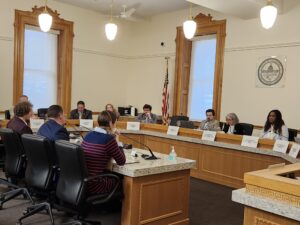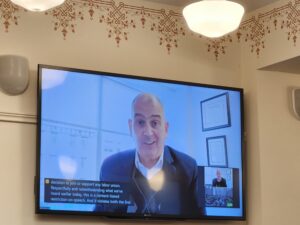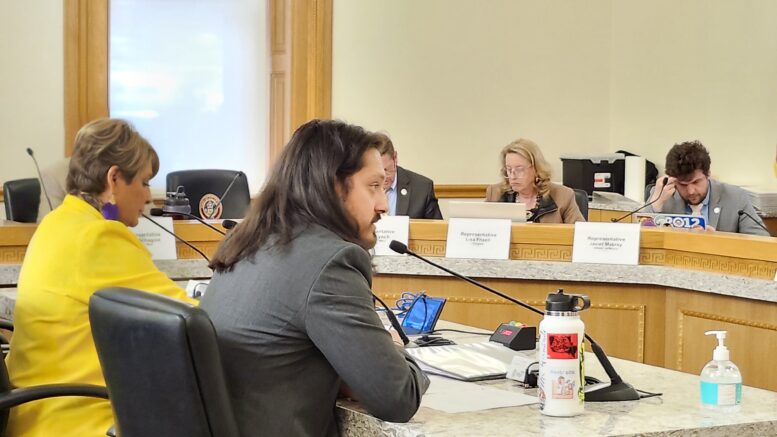Employers who require workers to attend meetings featuring political or religious messages and then retaliate against staffers who walk out or refuse to go could face newly permitted lawsuits under a bill that passed its first House Committee on Wednesday.
House Bill 1260 — sponsored by House Majority Leader Monica Duran, D-Wheat Ridge, and Rep. Tim Hernandez, D-Denver — is a pro-union measure, as a raft of witnesses told the House Business Affairs & Labor Committee that they hope to stop the “captive-audience meetings” in which employers tell staffers of their skepticism or opposition to organizing. But a slew of business organizations said the overly broad language defining political and religious speech could mean that they are not able to tell workers even about new laws that will affect the way that companies can operate.
The “Worker Freedom Act,” supported by groups including the Colorado AFL-CIO and the Service Employees International Union, follows similar laws in five other states, including a Connecticut statute used as the basis for HB 1260 that is being challenged in court. Proponents relayed stories to committee members about organizing workers being called into meetings in which they got one-sided diatribes against unions or heard stories trashing individual teammates leading unionization efforts.
Bill comes at crucial juncture for unions
This effort to protect unionization comes as more groups of workers, from Starbucks employees to Denver Art Museum staffers, seek union protections in Colorado. And both existing and prospective union leaders urged committee members to pass HB 1260 Wednesday largely on that basis, saying the Legislature should encourage protections for such efforts.
“This is an issue about whether employees have to sit in a room with their employers and listen to anti-union rhetoric,” said Melissa Benjamin, SEIU lead external health care organizer and a founding member of the Colorado Care Workers Unite union. “With things like captive-audience meetings, it hurts union efforts, and it hurts working people … We are here to change the rules that are stacked against working people the state of Colorado.”
The bill would prohibit an employer from requiring a worker to attend meetings, listen to speech or view communications concerning religious or political matters and also would bar employers from disciplining or firing workers who choose to exercise those rights. It creates a private right of action in district court that would allow them to seek lost wages, forward pay and attorney fees and mandates employers to post a notice of the new rights in the work area.

Colorado AFL-CIO Executive Director Dennis Dougherty, center, testifies as part of a panel supporting the Worker Freedom Act on Wednesday.
HB 1260, emphasized Colorado AFL-CIO General Counsel Richard Rosenblatt, does not bar employers’ religious or political speech — just any mandates they make that workers must sit through meetings involving such speech that aren’t critical to job duties. It has exemptions for religious institutions, non-profit religious hospitals and coursework and symposia at higher-education institutions, and it also specifies that workers who choose to sit through such meetings can’t turn around and allege rights violations.
Unintended consequences of HB 1260?
But even with those exemptions, the broad definitions of political and religious speech in the bill could lead to far-reaching consequences, several employers and employment attorneys warned.
Lucia Padilla, general counsel for Colorado Mountain College, said for example, that the definitions sweep in all discussions of new laws, and workers could refuse to sit through meetings about how their work may have to change because of newly passed laws. That same language could let city-government workers refuse to attend City Council meetings or even court hearings at which political and government matters are discussed, warned Elizabeth Haskell, Colorado Municipal League legislative and policy advocate.
Seth Ford, legislative liaison for the Colorado Department of Personnel and Administration, asked sponsors to remove definitions of political and religious speech altogether and just bar employers from requiring workers to attend coercive captive-audience meetings. But while Duran and Hernandez added clarifying amendments in response to the concerns — including one that specifies that employer-mandated diversity, equity and inclusion meetings do not count as political speech — they left most other language in place.
“This is going to create an enormous amount of litigation,” said Kate Mowry, a partner with Messner Reeves LLP who specializes in employment law. “I think it is really just a way to create more litigation.”
Federal law concerning workers and meetings

Littler shareholder Jim Paretti testifies remotely against the Worker Freedom Act on Wednesday.
Jim Paretti, a Littler shareholder representing the Colorado Chamber of Commerce, also said the bill violates the National Labor Relations Act, which allows employers to explain their concerns about unionization to workers as long as they don’t use threats.
David Seligman, executive director of the Towards Justice law firm, countered that he believes that the NLRA does not prohibit local laws allowing for employees to seek relief if they feel they’ve been retaliated against for their actions in unionization.
Committee members advanced HB 1260 on an 8-3, Democratic-led party-line vote to the House Appropriations Committee. But they did it with varying levels of enthusiasm as well as some pleas for further amendments.
Rep. Sheila Lieder, a Jefferson County Democrat and former union leader, lauded the proposal enthusiastically, saying that the stories of workers being forced into anti-union meetings show why it’s needed.
More definition sought on meetings from some
“The continued, atrocious abuses these workers have endured — you can’t make up these stories,” Lieder said. “Don’t break the law, and you won’t have to worry about the litigation.”
But Rep. Judy Amabile, a Boulder Democrat and former business owner, said that she believes sponsors have to define prohibited speech more clearly, so that employers who seek to comply with the law will know how to do so without risking lawsuits.
“If we’re going to hold people’s feet to the fire, it has to be very clear what they are doing,” Amabile said. “There is more work to be done before we have a finished product that people can live with.”
Duran said she expects to bring more amendments, though she did not specify on Wednesday what those might be.
